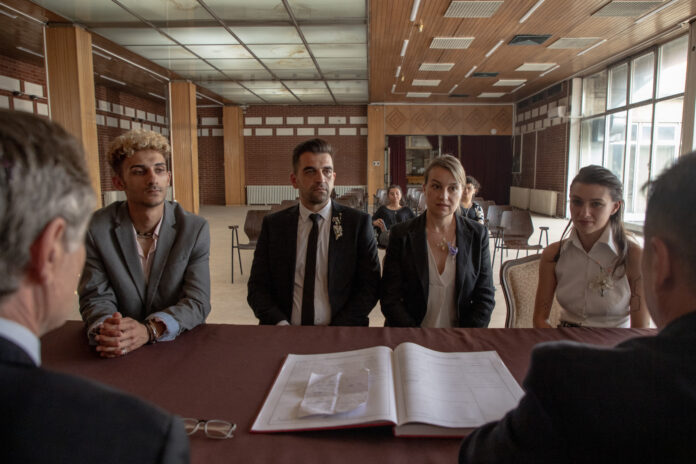
Out gay filmmaker Goran Stolevski’s shaggy comedy-drama, “Housekeeping for Beginners,” — opening April 12 at the Ritz Five and AMC Neshaminy — is an absorbing film about a queer chosen family that does not quite choose to be together. Viewers may feel offput at first as Stolevski opens in media res. The characters and their relationships slowly come into focus. But stick with it; the story gets more interesting and involved as it goes along.
Dita (Anamaria Marinca) and Suada (Alina Sebran) are a lesbian couple living in Macedonia. Suada has pancreatic cancer, and is seeking treatment, but the doctor is practically indifferent, and Suada is at her wit’s end. Dita tries to help and comfort her, but Suada has only one request — for Dita to be the (new) legal mother to her children, the teenage Vanesa (Mia Mustafi) and the preteen Mia (Dzada Selim).
Dita initially resists this request as her household is quite full. Toni (Vladimir Tintor), a gay man, lives with her, and, as the film begins, his latest hookup, Ali (Samson Selim, a real find), has decided to stay as well. A trio of young lesbians also hang out and live in Dita’s house off and on, adding to the chaos. (There is one bathroom).
Eventually, Dita relents, and, to make things legal, marries the not quite willing Toni. As this reformed family ekes out a living, there are dramas big and small that drive the episodic narrative. Scenes feature Dita, Toni, Vanesa and Ali discussing the Roma — Suada is very sensitive about being an ethnic minority — or grappling with the legal issues involving (straight) marriage and custody of children.
Stolevski shoots his film intimately, with a handheld camera, and he makes viewers feel as though they live in the house with Dita and her extended queer family. There is a coziness and a messiness to the kitchen, bedrooms and living rooms, where the characters eat, smoke, sleep, and do little else.
“Housekeeping for Beginners” focuses much of its loose plot on Vanesa, who tries to gain some independence. At one point, she plans to go live with her grandmother, whom she has not seen in years. However, a trip to visit her suggests Vanesa is better off living with Dita. Vanesa also plots to get married and move to Malta, but that option too, is unrealistic. Vanesa’s moodiness increases over the course of the film, and several instances — such as one involving the police — that generate some real dramatic tension. Mustafi imbues Vanesa with an attitude that is appropriate for a young woman who desperately wants to escape a life not of her making. She gives a very lived-in performance.
Likewise, Toni also has issues with the new family arrangement. He wants to have sex with Ali, but the young man is not always obliging. Dita also needs Toni to keep up appearances as a married couple — as when she gets invited to a dinner party — but he is uninterested. When Toni — frustrated with his situation —thinks Ali is cheating on him, an argument occurs that shakes the makeshift family unit.
Other situations ebb and flow, providing a real sense of love and animosity as the handful of characters interact. “Housekeeping for Beginners” eschews plot in favor of feeling, and the film’s authenticity is compelling. Stolevski provides a strong sense of place, especially in a gripping sequence that showcases interesting pockets of the city as Ali helps Dita and Toni track down Vanesa, who has gone missing.
While many of the characters are queer, the film is interesting for forcing Dita and Toni to hide their sexuality. (Ali does not and is often defined by it). Dita, however, is practically embarrassed to have a wedding ring, hiding it from her coworkers or overly sensitive when a woman she used to know discovers Dita is married. She also chastises Toni for wearing a “gay” shirt when he is supposed to be “passing” as her husband. That Toni is unable to live authentically is part of what causes his despair. He gets angry in one scene that gives Toni the opportunity to express the rage he has been suppressing. But Dita also must tamp down her desires. Surely, she is still grieving for Suada, and has taken on new, unwanted responsibilities raising the kids. Toni is not much of a co parent — Ali provides more help with Mia than her “husband” does — but still, this situation is not the life she planned.
“Housekeeping for Beginners,” is sunnier and more optimistic than its dramatic vignettes might suggest. This is a film about healing, and family. The main characters all come to accept themselves and each other as they go through the growing pains of living together. It is a gratifying film that sneaks up on viewers.
Anamaria Marinca, who appeared in Stolevski’s 2022 horror film, “You Won’t Be Alone,” provides a real sense of gravitas as Dita, while Vladimir Tintor makes Toni sympathetic as he is put in a series of awkward situations. Their wedding is a darkly comic highlight.
Some viewers may find Stolevski’s narrative approach off-putting or even excruciating, but for those who sink into the rhythms of “Housekeeping for Beginners,” there is real pleasure to be had.